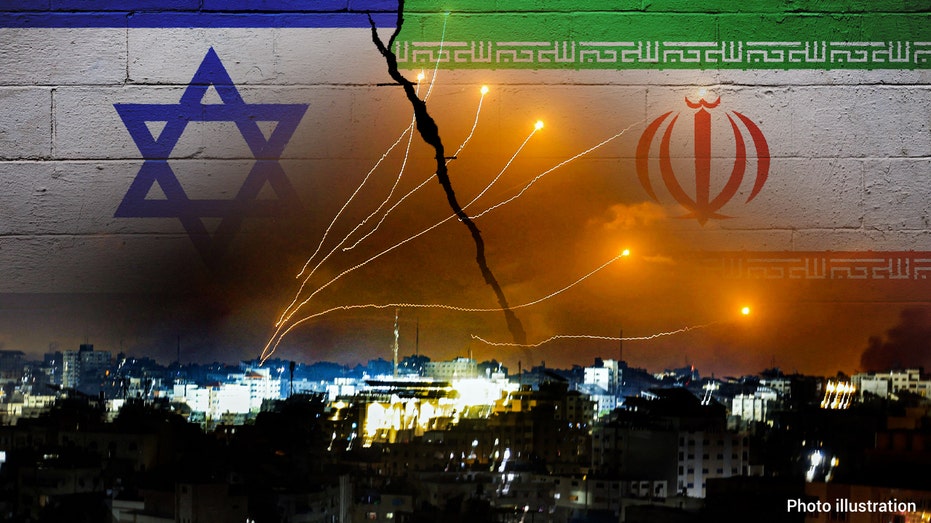Anxiety continues to mount over the threat of a regional conflict in the Middle East between Israel and Iran after Tehran this week pledged to hit the Jewish state following the assassination of Hamas leader Ismail Haniyeh late last month.
But even as Israel squares up against its greatest adversary, a potentially more lethal threat looms right on its border — Hezbollah.
“The big X factor here is Hezbollah,” former spokesperson for the Israel Defense Forces (IDF) and current senior fellow for the Foundation for Defense of Democracies (FDD), Jonathan Conricus told Fox News Digital. “Hezbollah has significant military capabilities at their disposal.
“They have nation state capabilities,” he added.
ISRAEL STARES DOWN ‘RING OF FIRE’ AS IRAN PLEDGES RETALIATION
The terrorist organization has been significantly backed by Iran for years, receiving weaponry, technological know-how and some $700 million annually, according to Israeli Defense Minister Yoav Gallant.
But it is not only their strategic capabilities that make them such a threatening force to contend with, it is the group’s proximity to Israel, explained Conricus.
Hezbollah, based along Israel’s northern border in Lebanon, has plagued Israel’s security apparatus since its founding in 1982 following the Israeli invasion of Lebanon, which was carried out in response to a series of inter-border spats with the Palestine Liberation Organization (PLO).
Israel has now found itself encircled by nearly two dozen terrorist organizations, the majority of which are backed by Iran in what has been dubbed Tehran’s “Ring of Fire.”
Jerusalem, in response to its growing threats, developed a security system known as the Iron Dome, which has been operational since 2011, and has on numerous occasions proven successful in blocking the majority of projectiles levied at Israel. However, the most recent war in Gaza has shown that the Iron Dome is not fail-safe and extremist groups can bypass the defensive system, causing an increasing sense of alarm.
Security experts agree that Tehran will likely use a multi-layered approach in its next attack on the Jewish state by relying on proxy forces like Hezbollah in an attempt to overwhelm Israeli, U.S. and U.K. defenses — an operational strategy that Conricus believes could prove successful.
NETANYAHU APOLOGIZES FOR OCT. 7 HAMAS ATTACKS, WARNS ISRAEL NOW FACES ‘FULL-FLEDGED IRANIAN AXIS’
“Hezbollah has significant rocket and missile capabilities that can create a temporary significant challenge for Israeli air defenses, even with the assistance of allied countries that will come to Israel’s assistance,” the 24-year IDF veteran said.
Conricus said that despite U.N. Security Council resolutions barring the collection of arms in Lebanon by non-government groups, Hezbollah has been able to “stockpile” Iranian, Chinese and Russian weapons.
The former IDF spokesperson said he believes that Hezbollah has so far showcased just a quarter of its strike capabilities, and Jerusalem has made clear it will not take a light approach to any attack by the terrorist group — gearing the region up for a brutal confrontation.
“Israel has signaled that this isn’t going to be the Second Lebanon War. This is going to be a much more fierce and powerful response from Israel, with less constraints and with less limitations because of what is at stake for Israel,” Conricus said in reference to the 34-day war in 2006 in which 120 IDF soldiers and 40 Israeli civilians were killed, along with the deaths of a combined 1,100 Lebanese civilians and Hezbollah combatants.
Israel, the U.S. and the U.K. have moved swiftly to bolster their defensive and offensive capabilities, and security experts continue to speculate how and when Iran will strike Jerusalem after it threatened to do so on Monday.
ISRAEL ISSUES MESSAGE TO LEBANESE CITIZENS AMID REPORTS OF POTENTIAL PREEMPTIVE STRIKE ON HEZBOLLAH
Following an emergency meeting by the Organization of Islamic Cooperation (OIC) in Saudi Arabia on Wednesday at the request of Iranian and Palestinian officials, acting Iranian Foreign Minister Baqeri Ali Bagheri Kani said Tehran will respond to the killing of Haniyeh at “right time” in the “appropriate” manner, the BBC reported.
While U.S. officials reportedly hoped the OIC would help ease tensions, the Iranian official told members of the bloc that “it is expected” that they back Tehran.
The OIC later released a statement saying it holds Israel “fully responsible” for the “heinous attack” — which Jerusalem has not claimed credit for — but it stopped short of expressing support for Iranian military action.
Iran, which attacked Israel in April with some 300 missiles and drones, is expected to carry out a strike two to three times as great in its next assault, Conricus estimated.
“The challenge here for Iran, and this might be the [reason for the] delay, is that they’re in a bit of uncharted territory having to fight for themselves,” Conricus said. “They are being careful and trying to calculate what the Israeli response to the Iranian attack will be, and what they will be putting on the line.”
Conricus described Iran’s Monday threats against Israel as “uncharacteristic” but noted the killing of Haniyeh, not only in Tehran, but in a complex heavily monitored by Iran’s Islamic Revolutionary Guard Corps, added “insult to injury.”
Iran has now positioned itself for a confrontation with Israel and its Western allies where it cannot only rely on its proxy fighters like Hezbollah, Hamas, the Islamic Jihad or the Houthis to carry out its strategic aims.
“They are in uncharted territory. They have to really fight,” Conricus said. “And the Iranians are not used to fighting for themselves.”
